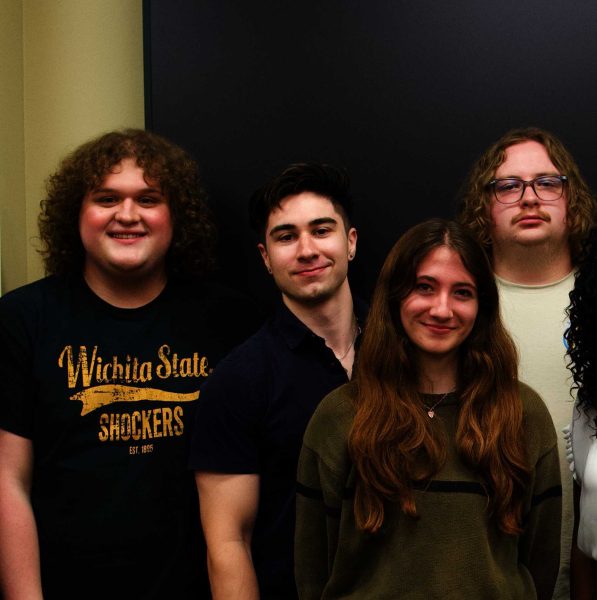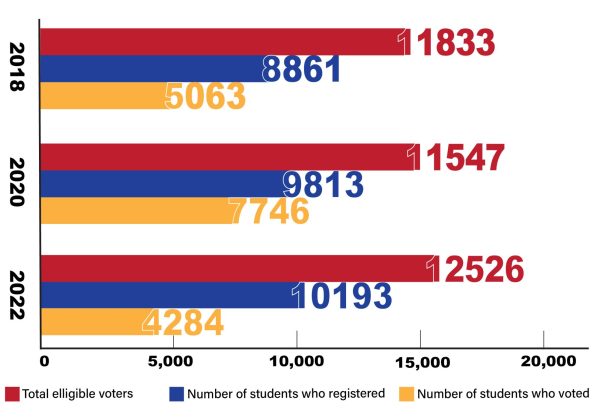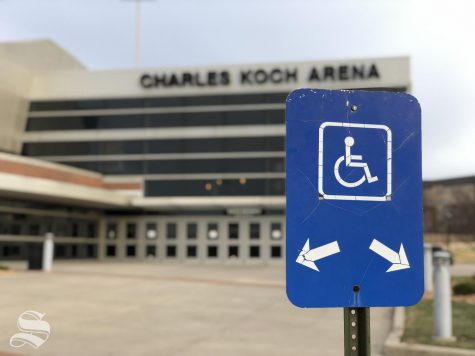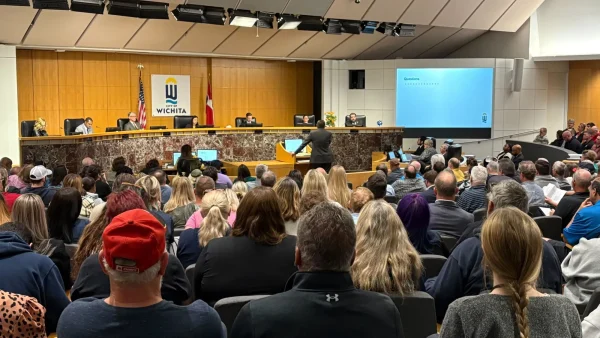Student Fees Committee proposes 2.7% increase to student service fee
John Kirk, senator of Fine Arts, at Wichita State University, fully fund the request the Student Involevemnt Seal. The comity met Tuesday morning and asked for $725,465.
The Student Fees Committee’s proposed budget includes a 2.7% student services fee increase, which is $10.17 per tier one student — an undergraduate student enrolled in 9 credit hours or more.
This year’s proposed increase is the largest in recent years. Last year, the committee originally proposed a 1% increase but had to keep it flat when KBOR would not sign off on it.
This is the first year of a staggered review cycle. Instead of student fees funding being allocated yearly, organizations will now be guaranteed their funding for three years. Instead of going before the committee every year, organizations are assigned a specific year — A, B or C.
Organizations also have the option of breaking their cycle if they want to request a different amount of money.
The committee met last week to finalize a proposed budget that will be sent to the student government’s budget and finance committee for review, then SGA’s student senate for a three-read process before being sent to the university president to be signed.
The big cuts
Many groups received less money than they requested..
Student Engagement, Advocacy, and Leadership (SEAL) initially received their full amount requested ($725,465), with Representative and Speaker of the Senate Jacob Tubach seconding the motion, saying that it is a great program that is unique to WSU. The committee went back after making initial decisions and reduced their funding to $701,748.
“It’s a good amount for them to still use,” Representative and Treasurer Zachary James said.
Campus recreation received $1,003,894 after requesting $1,038,266. The group’s amount was decreased two separate times, with Tubach commenting on the $20,000 increase from 2022.
“It’s hard for me to approach that figure and say I’m OK with adding $30,000 to that when $40,000 is already in the reserves,” Tubach said.
Campus activities received $259, 833, a decrease in $60,000 from their request. James motioned for this amount, saying that it would be easier to spread the remainder of the request out for the three years, giving them $20,000 in year two and $10,000 in year three. Teri Hall, vice president for student affairs, pushed for the request due to wanting to have two concerts next year.
ShiftSpace gallery’s request was debated heavily, after questioning their Registered Student Organization status, which is “frozen” because they did not renew it for this year. A motion was made initially by representative Kirk to give them $0 due to questionable RSO status.
“I would share my concern of eliminating funding for a position without at least some time to prepare for that,” Gabriel Fonseca, SGA advisor, said.
The motion to fund $23,000 and not their full request of $67,445 was made by James. The vote on the motion was tied, and James voted in favor to break it.
“Giving them at least a year [to see] how they will pay for this position is [the] right to do,” James said. “I’m really just looking to pay for the gallery itself.”
The most heavily debated organization was Varsity Esports, with the debate period being extended to come to a solution. The organization requested $85,000. Representative Tubach initially motioned to give them $0 due to them being housed under the college of applied studies and having access to university funding.
Hall said that the organization could be easily moved to campus recreation and that they were trying to find the right “home” for it.
“I’d like to remind you that we are trying to build a program … If we aren’t part of that we are going to be left behind [in D-1 esport teams],” Hall said. “At least give them the same funding.”
A new motion to fund $67,317 for salaries of the coach and two student employees was then discussed. Representative Gladys Heitzman spoke in negation, saying that this organization doesn’t benefit the majority of students on campus.
“I find it really hard to believe that students would want their student fee money to go towards this,” Representative John Ramey said.
Others felt that not giving the organization any funding would “tank” the program before they had a chance to grow, have good coaching and become more self-sustaining.
A new motion was presented by James to fund $67,317 for this year only and to have them come back next year with results, which was voted through. Later, the group cut the funding to $46,317 for 2023, which allowed for the coaches salary to be covered but not two student employees.
“It would be really bad to tank something that could create revenue in the future,” Representative Heitzman said. “Give them time.”
The Tilford Commission requested $55,000, and received $10,000 for this year, as well as for the next two years. At first, representative Kirk motioned to fully fund it because it is a great opportunity for all students. Representative James spoke in negation.
“The way that they prioritize their budget could be better, but it’s a great thing to have here,” James said. “It’s already funded from somewhere else, we don’t know where…. There are other places that could fund it.”
SGA Vice President and Representative Kamilah Gumbs also spoke in negation.
“Sometimes some services should just be catered to us and we shouldn’t have to fund them to get them ,” Gumbs said. “I feel like this is not as consistent and daily as a service like student health … this isn’t something that I believe our fees should be dedicated to … they have access to other various funds.”
The committee decided to suspend the deposit for this year.
The only line item that received full funding was the WSU Student Scholarship of the Year. They received $2,430.
EDITOR’S NOTE: This story was updated to include information about previous student fees proposals.

Julia Nightengale was a third-year reporter for The Sunflower, previously working as a Copy Editor and News Editor. Nightengale is a graduate student working...










FIRMWAREHACKS • May 6, 2022 at 8:58 pm
Binary scam recovery
lost loan money recovery
money laundry recovery
Device hack
Bank issues
Access to school/company/fellowship/organization files
Lost cars tracking
fraud payment
Access to cheating husband/wife device
extending and subtracting of stamped file concerning a giving end line period of time
tracing and recovering lost emails/conversations/contacts / and accessories
ETC
[email protected]
[email protected]
AS LOMG AS ITS TECHNOLOGY IT WILL BE HACKED , with firmwarehacks service you can get all of this and more done !!
❌ Binary Option, Forex and their likes are a means of making money but it’s more like gambling. There are no sure means to guarantee that a person could make profit with them and that’s why it can also be reasoned to be scam. Let’s not forget that some individuals even give you % guarantee of making profits and end up running away with your money. The internet today is full of Binary Option Recovery Scam, you see so much testimonies been shared about how a firm or Company helped them recover what they lost to Binary Options. But believe it, it’s just a way to lure more people and end up scamming them.
❌ You might have also come across some individuals that say they will give you guarantee on successful trades but they only end up as SCAMMERS as well. You here them say stuffs like 200% guaranteed in just 2 weeks and when you go into trade with them, they start telling you to pay profits percentage before you can get your income. These are all liars please avoid them. But if you have been a victim of this guys, then you should contact FIRMWARE now‼️
✳️The big Question is “Can someone Recover their money lost to Binary Option and Scam⁉️
I will say yes, and will tell you how.
The only way to Recovery your money back is by hiring HACKERS to help you break into the Firms Database Security System using the information you provide them with, Extract your file and get back your money. It seems like a really impossible thing to do, I will tell you, it should be impossible, but with the use of specially designed softwares known to HACKERS and Authorities (such as The FBI, CIA e.t.c) it is possible and the only way to recover your money.
✅FIRMWARE are a group of hackers who use their hacking skill to hunt down SCAMMERS and help individuals recovery their money from Internet SCAMMERS.
We just need the contact details of the SCAMMERS and Paymnet Info and within 4-8 hours your money will be return to you.
✳️ You can contact us via the emails below-:
[email protected]
[email protected]
2022 ©️ All right reserved ®️
George Anthony Chapa • Mar 17, 2022 at 4:44 am
I saw many people recommending the services of XAP Credit Solution and I am lacking much knowledge about how to better my credit score. I am 41 and have made a couple of poor choices in the past. I’m desperate to have my kids grow up in a home of our own. I needed help that would lead in that direction and XAP came highly recommended. Yes Xapcreditsolution @gmail. com didn’t disappoint, he fixed my credit and raised the score to a very high score of about 812 from low 500s. I was able to get my first house. Thanks to XAP and his team.
Lydia Humphreys • Mar 11, 2022 at 12:08 pm
The SGA’s reasoning for dropping ShiftSpace funding is insulting and without warning. There was no communication that we were under questionable RSO status and for that to be the main reason why they are litereally eleminating the position of Kristin Beal is unprofessional. ShiftSpace cannot funcition with only the rent being covered, we need Kristin and her position in order to be effective and for our students to have an adiqite educational experience. Not to mention we provide a good source of income for undergraduates, and removing that would deminish our efforts to maintain numbers. This decision is continuing the ridiculous trend of underfunding the arts especially with that decision being made by someone in the arts. Do better SGA.
Anonymous • Mar 10, 2022 at 5:57 pm
What did the Sunflower request and what did it get?